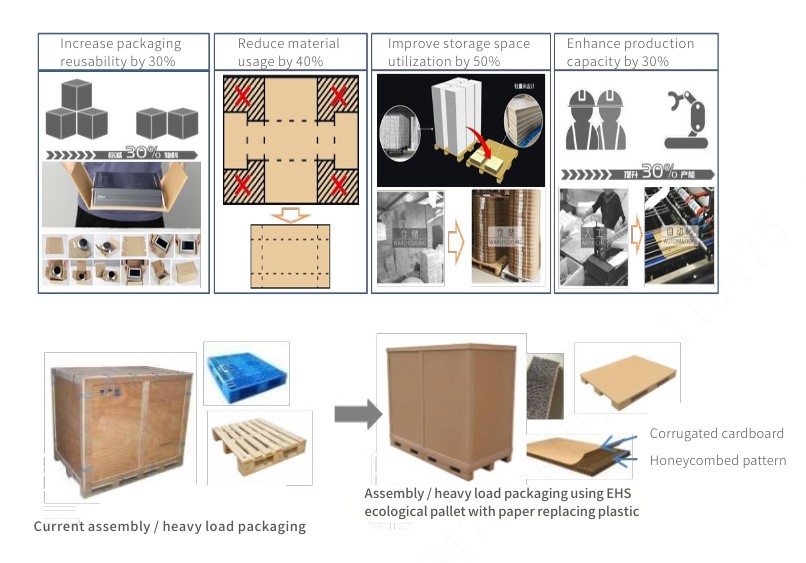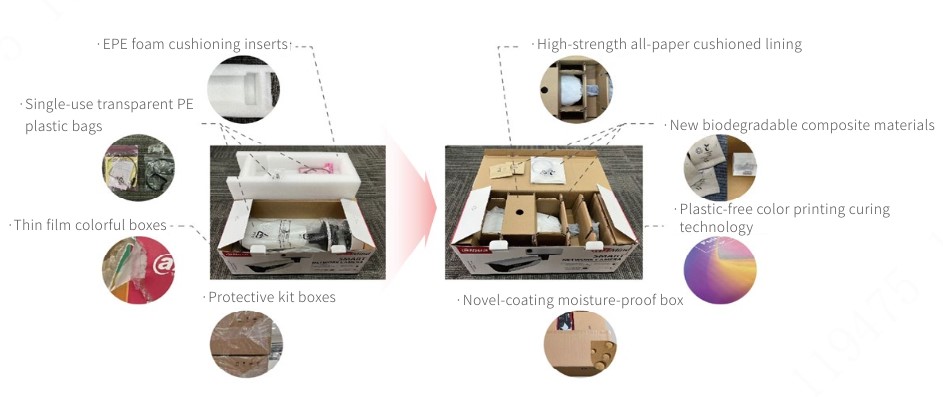At Dahua, we view environmental protection as one of our core responsibilities.
At Dahua, we view environmental protection as one of our core responsibilities. We integrate clean technology into the company's strategy and increase investment outputs in this area, particularly in R&D. In this article, we will explore how Dahua empower its green R&D capabilities, highlighting its green product management platform, utilization of green raw materials as well its upgraded green packaging.
Utilizing Green Product Management platform
Dahua embed green principles throughout the entire product lifecycle by establishing a Green Product Management (GPM) platform that facilitates integrated management of products’ green attributes. This platform significantly promotes standardized and process-oriented management of green R&D efforts, thereby enhancing the efficiency of our green product management.
Dahua also developed a Product Full Lifecycle Environmental Management Specification, which imposes rigorous standards and strict requirements for internal environmental management across various stages including product design and development, processes, production, logistics, sales, maintenance, and product recycling
Using green raw materials
Dahua places significant emphasis on managing green product attributes by integrating environmental requirements into the early stages of R&D. The company actively identifies and adheres to environmental regulations and standards for products in both domestic and international operations, encompassing key requirements such as RoHS, REACH, CA65, PAHs, among others. These requirements are internalized and integrated into Dahua's Hazardous Substance Restriction Requirements, which also extend to the company's suppliers, ensuring that our products meet stringent environmentally friendly and low-carbon standards right from the source.
Dahua also strictly adheres to the Hazardous Substance Process Management System (HSPM) in accordance with the IECQ QC080000:2017. This includes enhancing environmental data control mechanisms, developing multiple material library functions, and utilizing green materials to support green product development. Throughout the 2023 reporting period, the HSPM operated effectively, resulting in zero recall or customer complaint related to environmental compliance issues.
During the same year, Dahua added and updated 1,718 RoHS reports, covering over 97% of production materials. It also introduced new environmental testing equipment and conducted inspections on over 1,000 types of production materials with a 100% passing rate for self-developed RoHS sampling. Additionally, all types of different materials achieved a 100% coverage rate for REACH declarations. Over 1,000 products sold in Europe completed SCIP registration declarations, and the overall recovery rate for WEEE (Waste Electrical & Electronic Equipment of the European Union) products reached 80%.
Upgrading R&D techniques
While building a green product R&D platform and system, Dahua is dedicated to developing simulation designs. With high precision and efficiency, Dahua’s Galaxy Cloud Simulation Management Platform facilitates multidisciplinary simulation and cross-domain integration. This platform eliminates the need for actual testing or experiments in the R&D process, utilizing continuous technological innovation to support green development. At present, 100% of the Dahua's new product R&D has achieved simulation coverage.
In 2023, Dahua received the Excellent Organizational Award in Engineering Simulation Innovation Design at the Belt and Road Initiative and BRICS Countries Skills Development and Technological Innovation Competition. Several Dahua employees also received the Second Prize, Third Prize, and Excellent Award for Engineering Simulation Innovation Design in the same competition.
Optimizing R&D of green packaging
Dahua closely monitors the environmental impact of its product packaging. It follows the EU 2005/20/EC Packaging and Packaging Waste Directive, as well as relevant standards such as the GB/T 12123-2008 General Requirements for Packaging Design, the GB/T 8166-2011 Cushioning Packaging Design, the GB/T 6544 Corrugated Board, and the GB/T 13024 Carton Boards baseline requirements. Adhering to principles of light weight, standardization, and green sustainability in packaging materials, Dahua actively conducts research and development on green packaging materials, guided by the DH JS 1730 Packaging Design Technical Specification and the T/ZJAF 9-2021 Green Packaging Technical Specification for electronic security products.
Using lightweight packaging
Dahua is committed to utilize lightweight packaging, ensuring that its packaging effectively protects the products while minimizing the use of packaging materials and reducing packaging weight wherever possible. This approach not only reduces resource consumption but also lowers carbon emissions.

Dahua developed an industry-leading film composite packaging technology that utilizes a flat paper-film packaging structure to provide three-dimensional product protection in a flat package. This innovative design is 100% recyclable, resulting in a 40% reduction in packaging material usage and a 50% decrease in storage space requirements. Our patented non-equal-length composite core production process with paper film significantly reduces the average volume of product packaging by over 15%. On average, every million sets of products can save 12.5 tons of cardboard usage. This technology has been granted 31 authorized invention patents and 42 utility patents and is continuously being applied to key products in front-end, consumption, and storage segments.
Dahua also developed an EHS ecological pallet that use paper instead of plastic or wooden pallets, reducing the weight of the pallets by 50% and lowering energy consumption and carbon emissions during product transportation.
Implementing packaging standardization
Dahua implements packaging standardization to ensure that packaging materials meet the requirements of various products while promoting uniformity in packaging. This approach enhances the reusability and space utilization of packaging materials. Based on the standardized design of basic logistics modules, Dahua developed a modular packaging technology featuring 1 standard box specification and 22 packaging solutions, catering to the packaging needs of over 1,000 components. This technology is characterized by high reusability and significantly enhances the space utilization of packaged products in transport vehicles. Also, Dahua’s innovative film packaging technology not only reduces the consumption of materials but also increases the reuse rate of product packaging by 30%.
Upgrading green packaging
Dahua is dedicated to utilizing more environmentally friendly packaging materials, aiming to reduce the plastic content in its packaging in order to lower non-renewable resource consumption, minimize environmental impact, and promote the green recycling of packaging materials. Dahua introduced green plastic-free packaging technologies to replace non-degradable plastic components in its packaging through its initial research on degradable films and cushioning foam materials, along with the development of high strength all-paper cushioned linings, plastic-free color printing curing technology, and novel-coating moisture-proof boxes. This initiative effectively reduces plastic waste, standardizes packaging materials, decreases solid waste disposal requirements, promotes recycling and reuse, and enhances the overall degradability of the upgraded packaging. As a result of these efforts, the company have achieved a 9% reduction in plastic content in product packaging, equating to an annual reduction of 8 tons of single-use plastic per million units.

Dahua mainly uses paper, plastic, wood and metal in its product packaging. The table below shows Dahua’s consumption of paper and plastic packaging over the years:
For more information about Dahua’s Green R&D, check out the 2023 ESG Report
here.